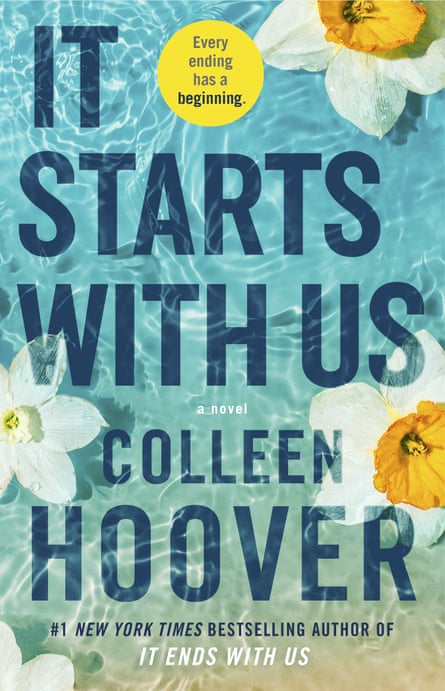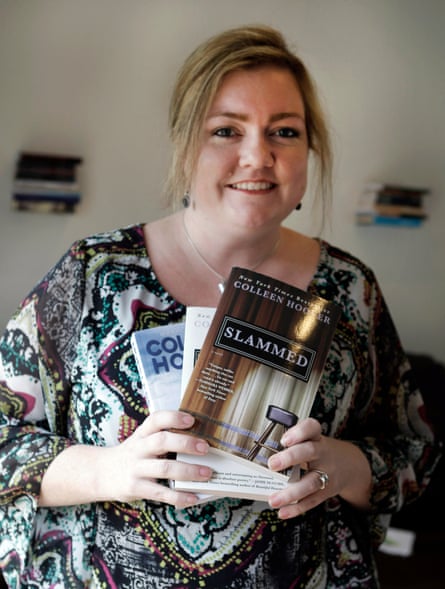Colleen Hoover’s book titles might lack the recognizability factor enjoyed by the Harrys and Twilights of the world, but there is no escaping the reigning queen of BookTok.
CoHo, as the author is called by her legions of fans, is everywhere: in the hands of your fellow subway rider, on the tablet that the receptionist at your dentist’s office is hiding beneath the front desk. When I mentioned to a bookish colleague that I was going to be writing about the woman who has become America’s bestselling novelist, her blank expression slowly came to life. She consulted her Kindle app and confirmed that she’d inhaled one of Hoover’s books over the summer. “It wasn’t so bad,” she said.
She’d read Verity, a sexy thriller about a disabled literary superstar and the woman her handsome husband hires to complete an unfinished work. It was self-published in 2018 and later picked up by Grand Central Publishing. The title currently occupies the No 2 spot on the New York Times paperback trade fiction bestseller list, perched one notch below Hoover’s It Ends With Us, a steamy and violent romance. There are four more books by Hoover in the top 10, and her All Your Perfects is No 11.

Four million copies of It Ends With Us have sold in the US to date, and 20 million Hoover books have sold globally. (She is especially big in the Philippines and Brazil.) These would be big numbers in any industry, but are especially stunning in one where bestsellers are often counted in the tens of thousands. The literary establishment has long counted on movie tie-ins or celebrity platforms to set a blockbuster in motion, but neither factor is at play in Hoover’s case. Her Twitter bio reads: “I don’t get it either.”
Originally published in 2016, It Ends With Us became a bona fide phenomenon over the pandemic via BookTok. This subset of TikTok, where enthusiastic readers share book recommendations, is credited with making many of today’s bestsellers, from Madeline Miller’s Circe to the suddenly trendy work of Agatha Christie. #CoHo videos on TikTok are often viscerally performative, starring readers so overcome with emotion that they are gasping and screaming. In the time-lapse video that @Weebna posted of herself reading Ugly Love in one day, she can be seen burying her face in the pages to absorb the tears. The TikToker @eloisehamp uses the sleeves of her sweatshirt for the same purposes in her CoHo sob session. A synthetic female voice narrates “hehe I seriously couldn’t breathe lol” while she has her literary meltdown in her bedroom.
The mid-career success story of Colleen Hoover, a forty-something Texan mother of three who has written over 20 novels across multiple genres, is partly a testament to the power of social media. And yet that’s only a piece of the equation. As far as current sales go, Hoover is without rival.
“I’ve never seen anything like this,” said Ariele Fredman, deputy director of publicity and marketing at Atria Books, the publisher of It Starts With Us, the forthcoming follow-up to It Ends With Us. Fredman has been busy packing kits of temporary tattoos and murals for the midnight pajama parties scheduled to take place at bookstores across the US for the 18 October release. “I’ve seen plenty of books become smash hits,” she said. “But the extended engagement is … almost weird.”
It’s a steady burn that has mystified Angelica Manglona, the manager at Buxton Books in Charleston, South Carolina. “The longevity is what stands out the most,” she said. “We have books that fly off the shelves when they come out – like Crying at H Mart, or The Summer I Turned Pretty – but it will generally last a week, or a month, and then sales peter out. The Colleen Hoover books keep selling.”
Courtney Poullas, 36, who lives in Youngstown, Ohio, read Verity, her “gateway” Hoover book, last year, and has blown through half a dozen since. “I used to read highbrow literature,” said Poullas, an English professor who once considered William Shakespeare her favorite author. “Colleen Hoover has a way of making you relate to the characters, and her language choices tug at my heartstrings. She makes me feel so much.”
The feelings that Hoover’s works inspire aren’t pretty. It Ends With Us opens with a “meet cute” that isn’t all that cute: the kind and pretty and young Lily Bloom is taking a moment to herself on a Boston rooftop when she witnesses a gorgeous man with impressive biceps kick a patio chair. This man turns out to be Ryle Kincaid, a rich neurosurgeon. The book chronicles their relationship, rife with sexual tension and an increasing store of violent outbursts. Filled as it is with yearning and five-alarm bedroom scenes, It Ends With Us is, at its core, a tale of domestic violence. In the afterword, Hoover shares that the story was inspired by the toxic relationship of her parents. Her father was physically abusive to her mother, and the two separated when she was a young girl.
The impetus behind It Starts With Us was decidedly less grim. Hoover wrote it as a thank you to her TikTok fans, as she shares in the book’s foreword. Here, the cycle of domestic abuse gets a Disney fairytale spin. While she is still harassed and haunted by Ryle, whose jealousy and controlling nature show little signs of abating, Lily is free to pursue a relationship with her true love, another improbably named man: Atlas Corrigan, who was her first love and is now a wildly successful Boston chef.
In her past life, Hoover was a social worker. As CoHo legend has it, she had no computer of her own so she borrowed her mother’s work laptop and wrote in the middle of the night. A desire to help others shines through her work. Using plain prose that goes down as easy as value-table white wine, she embeds lines like: “There is no such thing as bad people. We’re all just people who sometimes do bad things” and “Just because someone hurts you doesn’t mean you can simply stop loving them”.
Lily is done with the “naked truths” that she and Ryle once traded in their intimate moments. In the more cheerful follow-up, Lily is dealing with some hard truths. While Hoover glosses over some of the realities that certainly affect the Lily Blooms of the real world – childcare, for one, always seems to be sorted out in this novel – there are other themes that feel refreshingly true to life: the awkwardness of starting to date as a newly single mom, and reflections on the inconvenient fact that exes don’t just evaporate.

Like many of today’s bestselling authors, Hoover doesn’t overly concern herself with character development. The people who populate her books can generally be slotted into two categories: likable heroes or monsters. In lieu of personality traits, they carry past traumas or past transgressions. And for all the plot twists and gut-punching climaxes that Hoover’s fans rave about, internal transformations are light on the ground.
As the critic Parul Segal put it in her viral New Yorker essay on the vogue for trauma fiction: “The trauma plot does not direct our curiosity toward the future (Will they or won’t they?) but back into the past (What happened to her?).” Hoover delivers tales packed with devastating backstories and few of the challenges so common to literature: the elaborate subplots, the webs of contradictions, the sentences so dazzling that they beg for a reread. Here is the trauma story retrofitted for the Hallmark channel. Dark as Hoover’s fantasies may be, the books themselves are normcore to the bone.
Using few physical descriptions and sticking to references that most readers will have heard of (Lily carries her passion for Finding Nemo into adulthood), Hoover has created screens that readers can project themselves on to, and messed up situations that serve as funhouse mirrors of her fans’ own pains and problems. As the critic Laura Miller put it in her Slate essay on the author’s popularity, eliding quirk and verve is the secret to her success: “The blandness of Hoover’s characters makes them easy for anyone to identify with, and the smooth, featureless quality of her prose makes her novels easy to breeze through in a day or two.”
Hoover wrote It Starts With Us with the express goal of making TikTok happy, and it will be shocking if she doesn’t do just that. “I realized most of you weren’t asking for me to put [Lily and Atlas] through more pain,” she writes in the afterword. “You simply wanted to see Lily and Atlas happy.” It Ends With Us was a tumultuous tale that made people feel alive in those numbed-out days of early lockdown. Its soft and fluffy follow-up just might be perfectly calibrated for a moment when when everybody’s meant to be rebounding but too wrung out to bother trying.
Techyrack Website stock market day trading and youtube monetization and adsense Approval
Adsense Arbitrage website traffic Get Adsense Approval Google Adsense Earnings Traffic Arbitrage YouTube Monetization YouTube Monetization, Watchtime and Subscribers Ready Monetized Autoblog
from Kindle Publishing – My Blog https://ift.tt/ErQZzpi
via IFTTT


No comments:
Post a Comment